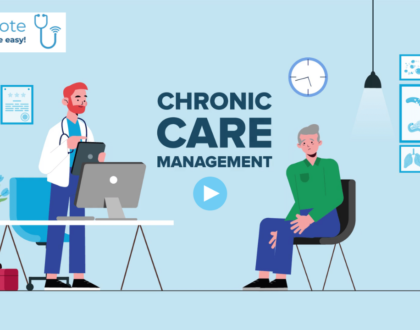
How Chronic Care Management Benefits Patients – Healthmote
Chronic care management (CCM) plays a vital role in improving the quality of life for patients with long-term health conditions. By providing comprehensive and coordinated care, CCM offers numerous benefits to patients, helping them better manage their conditions and lead healthier lives.
Benefits of Chronic Care Management for Patients:
1. Personalized Care Plans:
CCM initiatives craft individualized care strategies designed to address the specific needs and health objectives of every patient.
These plans consider factors such as medical history, current health status, lifestyle, and preferences.
2. Enhanced Communication:
CCM facilitates regular communication between patients and their healthcare providers, including physicians, nurses, and care coordinators.
Patients can easily reach out to their care team for support, guidance, and assistance with managing their health.
3. Improved Access to Care:
Patients enrolled in CCM programs have improved access to healthcare services, including preventive care, routine check-ups, and specialist consultations.
This helps ensure that patients receive timely and appropriate care, reducing the risk of complications and hospitalizations.
4. Medication Management:
CCM includes medication management services to help patients adhere to their prescribed medications and avoid medication errors.
Healthcare providers monitor medication usage, address any concerns or side effects, and educate patients about their medications.
5. Disease Monitoring and Management:
CCM programs monitor patients’ chronic conditions closely, tracking key health indicators and identifying any changes or worsening symptoms.
Healthcare providers intervene promptly to adjust treatment plans, provide additional support, or address emerging issues.
6. Coordination of Care:
CCM promotes coordination and collaboration among different healthcare providers involved in a patient’s care, including primary care providers, specialists, and allied health professionals.
This ensures that all members of the care team are informed and working together to address the patient’s needs comprehensively.
7. Health Education and Support:
CCM offers health education and support services to empower patients with the knowledge and skills they need to manage their conditions effectively.
Patients receive guidance on self-care practices, lifestyle modifications, symptom management, and coping strategies.
8. Continuity of Care:
CCM promotes continuity of care by maintaining ongoing relationships between patients and their healthcare providers.
Patients receive consistent and continuous support, regardless of changes in their healthcare team or settings.
9. Patient Engagement and Empowerment:
CCM encourages active patient engagement and participation in their care, empowering them to take control of their health.
Patients are involved in decision-making processes, goal-setting, and care planning, fostering a sense of ownership and accountability.
10. Improved Quality of Life:
Ultimately, the benefits of chronic care management translate into an improved quality of life for patients.
By effectively managing their chronic conditions, patients can enjoy greater independence, mobility, comfort, and overall well-being.
Chronic care management offers a comprehensive and patient-centred approach to managing long-term health conditions. By providing personalized care plans, enhanced communication, improved access to care, medication management, disease monitoring, coordination of care, health education, continuity of care, patient engagement, and empowerment, CCM benefits patients in numerous ways. Through these services, patients can better manage their conditions, reduce complications, and enjoy a higher quality of life.
Read More Articles:
The Role of Remote Patient Monitoring and Chronic Care Management
Enhancing Patient Well-being through RPM & CCM Solutions

 Linkedin
Linkedin

